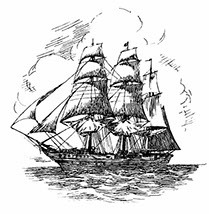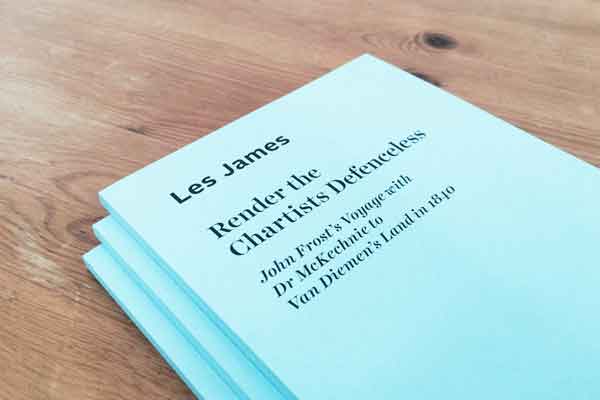
 Spies, Agents and the entrapment of John Frost
Spies, Agents and the entrapment of John Frost
A chance at Big Pit, Blaenavon on Saturday 12 November at 1.30pm to hear Les James talking about his recent book
Throughout 1840, John Frost was convinced that the authorities were seeking to entrap him. This fear continued aboard the Mandarin and left memories that stayed with him throughout his time in Van Diemens Land. He returned in 1856 with the surgeon superintendent firmly in his sights and his anxieties concerning agents of the state proved well founded, when he was subjected to a savage character assassination by the press.
Extract:
Render the Chartists Defenceless: John Frost’s Voyage with Dr. McKechnie to Van Diemen’s Land in 1840, © LES JAMES 2015, pp41-43
Aboard the Mandarin – Frost and McKechnie
04 May Frost extolled the virtues of Dr. McKechnie in two letters ready for posting at the Cape. To O’Connor: “The Commander Dr. A. McKechnie received us with much Kindness, he promised to do all in his power to make us comfortable during the voyage, & well has this Gentleman redeemed the pledge. I hope the Chartists will not forget this, but that they will shew themselves as sensible of kindness as of cruelty.”

To Morgan Williams: “We have experienced very kind treatment at the hands of the Commander, Dr. A. McKechnie, and I should be glad if the men of Merthyr would on his return to England, make this Gentleman a present of a Ring as a token of their respect for his treatment of their representative and that of Messrs Williams and Jones.”37
Such effusive compliments suggest Frost’s doubts about McKechnie were yet to jell or it could be that he desperately needed to ‘curry favour’
According to Frost, when writing in the USA (1855):
We were within a few days’ sail of the Cape of Good Hope. I was one evening talking with the surgeon-superintendent, who was rather hasty in his temper. I left him for a few minutes and went forward. On my return the ship was all in confusion; the guard on the poop with bayonets fixed and muskets loaded; the captain and the doctor running about in a state of great excitement. A mutiny had been discovered – or rather a design to mutiny. I was not absent from the spot ten minutes; in that time the parties contriving had been tried and sentenced to be flogged; and when I returned they were (a sailor and a prisoner) stripping for punishment. They were punished and in my opinion without the least foundation as to guilt. I think the doctor was afterwards convinced of this.38
What was it Frost said to McKechnie that caused his outburst of temper? Did it have any connection with what happened minutes later? It should be noted that Frost did not claim he had seen the flogging. Mutinies were rare, but threats of mutiny regularly occurred aboard convict ships. Bored military relished such occasions. At the merest hint of insubordination, the prisoners were ordered below and hatches locked, so soldiers and crew could search the decks. If Frost was correct in estimating a sixth of the convicts as army offenders,39 sufficient grudges would have built up by this half way mark to cause friction. The 30 soldiers on board would be expectantly itching for action. Their officers may have shared unease about the discipline regime and welcomed a chance to demonstrate army prowess and paramountcy.
Frost never repeated this story when he returned to Britain. Although, he did speak at Padiham about a ‘mutiny plot and very definitely incriminated Williams, though he did not name him:
“When we had got within a few days’ sail of the Cape of Good Hope, a letter was brought to me by a prisoner. In that letter I was asked whether I and my companions would engage in an attempt to take the ship from the authorities, and the writer assured us that if we would engage in such an attempt, and were successful, he would ensure that we should he obeyed.
Now that letter put me into an embarrassing position. If the surgeon superintendent had been aware that I had received a letter of that sort, and had not disclosed it to him, he would have called it treason… But I did not like to betray the man who had written thus, supposing him to be honest in his intentions; I therefore showed the letter to one of my friends and he seemed inclined, I thought, to make the attempt suggested.
I then said, ‘Let us examine the matter fairly; we have made one mistake, do not let us make another. Suppose we make the attempt and fail; our death will not be a very honourable one, for if we should not be killed at once, but taken prisoners, we are sure to be hung. There is no one to save us here; no agitation to keep the matter alive and frighten the Government out of their intentions. In the next place, suppose we should succeed, what are we to do with the 212 (sic) prisoners on board? In two hours they would be masters of the ship, and if we attempted to prevent their doing that which they would be sure to do first thing, procure drink, they would throw us overboard. For my part I shall have nothing to do with it.’ I then put the letter into the fire and said nothing more about it.”
Frost viewed the event as entrapment and argued “That prisoner would not have obtained writing paper without the knowledge of someone in authority on that vessel, and as for finding the opportunity of writing a letter unobserved in a convict ship, that was quite out of the question”. Having failed to induce suicide, he believed Government agents generated a mutiny with the intention “that we should have been hung”.
Possession of writing paper is hardly conclusive evidence of Mckechnie’s connivance. It would not have been too difficult for a malcontent prisoner to acquire pen and paper. McKechnie’s ‘liberal’ regime, encouraged a range of activities amongst the prisoners; they mingled during exercise on deck and had contact with certain members of the crew. He wrote nothing about the event in his log and Frost would have been totally unaware of the considerable efforts taken by McKechnie and Muddle to calm things down.
07 May: McKechnie ordered the Captain to enter Simon’s Bay at the Cape, where they anchored at 10am. In his log, McKechnie explained fresh food supplies, including meat, as his reason for entering port. A member of the crew left the ship.40 Letters and messages were taken to England. Captain Muddle reported to his employers the timings of the ship’s untroubled journey, the quantity of water taken on board and that “there was a tendency to scurvy that caused the doctor to come in here.” His letter reached the Press in July, including the Monmouthshire Merlin, (25/07/1840).
Despite Capt. Muddle’s reassuring letter, rumours spread - “it was the intention of the convicts to take forcible possession of the Mandarin, and carry her to America; and a convict, named John Black, was to take the command of the ship. One of the guards was concerned in the diabolical plot.” (The Times 24 July 1840) No convict of that name is listed in the Mandarin manifest. Three weeks later, The Times recanted with a reassuring report sent by a military officer from Perth aboard the Mandarin:
All on board were then well, peaceable, and submissive. The three Chartist leaders are described as well and hearty, and much improved in appearance and spirits since they left their native strand. They are extremely grateful for the kindness with which they are treated by the officers under whose charge they are ….. None of the convicts are in irons except one refractory subject. (Perhaps the convict Frost witnessed stripped on the deck for flogging?) There are 211 prisoners on board. They are encouraged in dancing, fencing, and all other exercises tending to promote health; and the officers have established a school, at which a number who scarcely knew their letters when they left England had learned to read the New Testament with advantage.41
Render the Chartists Defenceless: John Frost’s Voyage with Dr. McKechnie to Van Diemen’s Land in 1840, LES JAMES (2015)
ISBN 978-1-78461-232-0
The book is available direct from the publishers, Three Impostors
http://www.threeimpostors.co.uk/RENDER for £10 (p&p included)









